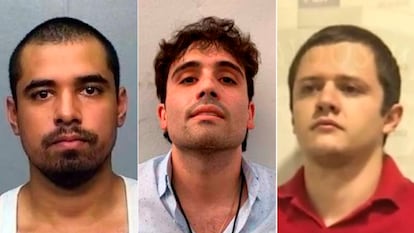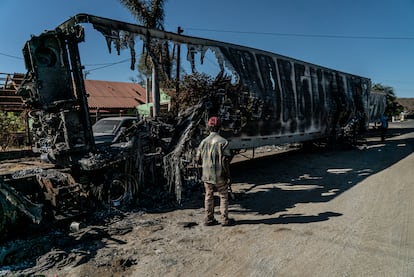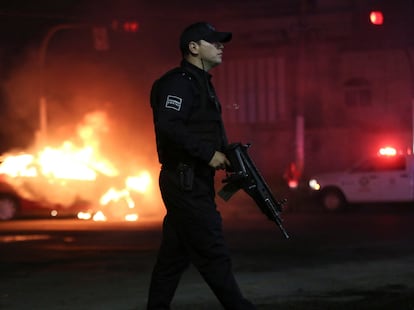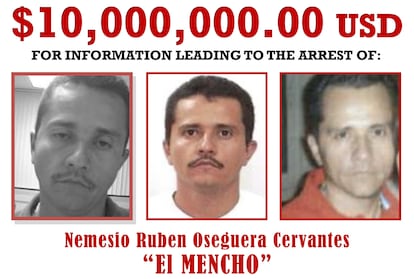The U.S. closes in on the ‘narcojuniors’
American authorities are tightening the net around the clans of aging drug lords like Joaquín Guzmán, Rubén Oseguera and Rafael Caro Quintero

The United States has charged Rubén Oseguera (also known as El Menchito, Rubencito or Junior) with firearms possession and trafficking in cocaine and methamphetamine. The defendant is the son of Nemesio “El Mencho” Oseguera, leader of the Jalisco New Generation Cartel (CJNG) and one of Mexico’s most feared drug traffickers. If convicted, he faces a minimum of 15 years in prison and will have until April 12 to decide whether to cut a deal with authorities or go to trial in a Washington, DC court. El Menchito is the latest in a long list of diminutive nicknames who have become priority U.S. law enforcement targets. The list includes Ovidio Guzmán, son of Joaquín “El Chapo” Guzmán and leader of the Los Chapitos faction of the Sinaloa Cartel; Osiel Cárdenas Jr., the namesake son of the Gulf Cartel founder; and Ismael Quintero, nephew of Rafael Caro Quintero, who was on the FBI’s most wanted list for years. The U.S. has stepped up its pursuit of these “narcojuniors,” the heirs to some of the world’s most powerful criminal empires, and hopes to bring them down by turning key informants in cooperating witnesses.
El Menchito was arrested on June 23, 2015, and released a week later on a judge’s order. Minutes after his release, Mexican authorities arrested him again for the disappearance of two people. He was finally extradited to the U.S. in February 2020 after the U.S. Embassy in Mexico was threatened and a bloody turf war erupted between CJNG and the rival Sinaloa Cartel. U.S. authorities said at the time that El Menchito was his father’s second in command in the CJNG. Prosecutors say Rubén Oseguera started in the family business six years ago when he was just 17, and was groomed to follow in the footsteps of his father. The U.S. has offered a $10 million reward for Nemesio Oseguera’s capture, on top of Mexico’s reward of 30 million pesos ($1.5 million).
“The CJNG was formed in Jalisco [central Mexico] more than a decade ago, and has developed a drug pipeline from Colombia through Central America to the United States,” said the court documents obtained by EL PAÍS. The 33-year-old El Menchito has dual nationality (U.S. and Mexico), so American authorities consider him a high flight risk and requested special detention measures. “The CJNG exercises a high degree of corrupt control in several municipalities and states in Mexico, and can ensure the defendant’s freedom if he were to return to there,” stated the U.S. Attorney General’s request. Like Genaro García Luna, a former security minister in the Calderon administration (2006-2012) who was convicted in February 2023, U.S. prosecutors say their case is built on the testimony of several cooperating witnesses. However, unlike García Luna, they also have recordings of intercepted communications between cartel members.

On January 5, two weeks before the start of García Luna’s trial in New York, Mexican authorities announced the arrest of Ovidio Guzmán (also known as El Ratón), in Culiacán, the capital of Sinaloa state and a stronghold of the Sinaloa Cartel. In late February, the request for his extradition to the United States was leaked to the media. Like El Menchito, Guzmán started young in the drug trade when he was just 18 years old. He faces a cocaine and methamphetamine trafficking case in the same Washington, DC court where Oseguera was indicted. “Sources indicate that Ovidio Guzmán López ordered the murder of informants, a drug trafficker and a famous Mexican singer who refused to sing at his wedding,” said the US State Department profile.
El Chapo’s son is now 33 and has implemented a legal strategy to delay and ultimately avoid extradition. His latest ploy is to claim Mexican authorities misidentified him. “I’m not the person the United States says I am.” In early April, a judge granted him a stay of extradition until another court determines whether charges will be dropped for due process violations. This issue will be resolved on April 21, although the extradition process is expected to drag on for months or even years.
In late March, the U.S. Justice Department announced that Osiel Cárdenas Jr., son of the former Gulf Cartel leader who used the ultra-violent Los Zetas as the cartel’s enforcers, had signed a plea deal for the arms trafficking charges he faced. The younger Cardenas oversaw the April 2021 purchase of 10 high-caliber weapons, five AR-15-type rifles and five AK-47-type rifles. He attempted to make the $15,000 purchase in a Brownsville, Texas parking lot, but one intermediary in the transaction was an undercover agent.
Also known as Ozo or Junior, Cardenas (who was born in Brownsville) was already on probation for another weapons charge. In March 2018, he was arrested for pulling a gun in a Brownsville nightclub. He drunkenly posed as a federal marshal and threatened to arrest everyone in the Sky Sports Bar if they didn’t leave immediately. When the police arrived, Cardenas showed them a fake badge. He was given a 27-month prison sentence and fined $15,000. Junior’s failed weapons deal resulted in another nine years in prison and a $20,000 fine. The senior Cardenas was extradited from Mexico in 2007 and sentenced three years later to 25 years in prison and ordered to pay $50 million.

The web of family ties in the upper ranks of the Sinaloa Cartel and CJNG has been exploited by prosecutors who increasingly use cooperating witnesses to weaken cartels amid the fentanyl crisis sweeping the United States. Antonio Oseguera (alias Tony Montana), El Mencho’s brother, was arrested in December 2022 in the Jalisco town where he had been arrested seven years earlier. Mexican authorities say Tony Montana headed the Jalisco Cartel’s money laundering operations and arms purchasing for the never-ending turf wars with rival cartels. The United States announced in January 2023 that Antonio Oseguera is wanted on cocaine and methamphetamine trafficking and firearms possession charges in the same Washington, DC court where his nephew will face trial. He is now held in Mexico’s Altiplano maximum security prison, where Ovidio Guzmán is incarcerated. Antonio Oseguera was arrested in Mexico eight years ago and released because of a procedural error: a judge failed to sign a key court document.
Other members of the Oseguera clan are also facing American justice. In December 2022, José and Gerardo González Valencia, two brothers-in-law of El Mencho, pleaded guilty to cocaine trafficking in the United States. The brothers were leaders of Los Cuinis, the CJNG’s paramilitary wing, and had been hiding out for years in South America. José González was arrested in Brazil in 2017 and extradited to the United States in 2021. Gerardo González was arrested in Uruguay in 2016 and extradited in 2020. Scheduled for early 2022, their trials have been postponed. The González brothers are charged with managing an international drug trafficking network that operated in Mexico, Guatemala, Colombia and other countries. Like their nephew El Menchito, they were indicted in Washington DC and face 10 years to life in prison. Gerardo will appear before a judge for sentencing on April 6 and his brother the next day.
Gerardo and José's brother, Abigael González Valencia (also known as El Boss, El Cuini and El Cachetes) has been detained in Mexico since 2015 and avoided extradition to the United States in 2019. The United States District Court for the District of Columbia has charged Abigael and El Mencho with organized crime, drug trafficking, firearms possession and murder. In 2016, five other González Valencia siblings (Arnulfo, Édgar Edén, Elvis, Marisa Ivette and Noemí) were included on a U.S. Treasury Department blacklist for their roles in the Los Cuinis and CJNG criminal organization.
El Mencho’s wife, Rosalinda González Valencia, was arrested for money laundering and organized crime in the Guadalajara (Jalisco) metropolitan area. A Mexican judge recently denied her legal motion and she will remain incarcerated in a federal prison in Morelos state. Mexican authorities believe there are at least 18 siblings in the González Valencia clan. Jessica “La Negra” Johanna Oseguera is El Mencho’s daughter and was in charge of the cartel’s financial operations until she was arrested in 2020 while visiting her brother Rubén in prison. In April 2021, she was sentenced to 30 months in prison and released a year later.

The hunt for El Mencho Oseguera has ensnared a very long list of criminals. In March 2020, US authorities announced that Operation Python led to over 600 CJNG arrests. The Gonzalez Valencia brothers went down during another operation called “Stir the Pot,” designed to escalate tension between Mexican criminal organizations. Nevertheless, the CJNG remains strong in Mexico and beyond. U.S. Secretary of State Antony Blinken recently released a video announcing “a new approach” in the joint US-Mexico drug war, but did not elaborate further.
Mexico’s top crime families were roiled when Vicente Zambada, Sinaloa Cartel co-founder Ismael “El Mayo” Zambada’s eldest son was arrested in Mexico City and extradited. Charged with trafficking $1 billion worth of drugs for the Sinaloa Cartel in 2013, Vicente Zambada signed a plea deal and provided key testimony for Chapo Guzmán’s conviction. In 2021, after ratting out over 100 drug lords, he was quietly released by US authorities and his whereabouts are currently unknown. Oscar (El Lobo) Nava Valencia, leader of the defunct Milenio Cartel and El Mencho’s former boss, has been a cooperating witness for over 10 years and recently helped convict García Luna.
In March 2023, Ismael “El Fierro” Quintero was extradited to New York on drug trafficking and firearms charges. He will be prosecuted by the same team and tried in the same court where García Luna was convicted. The U.S. has been doggedly pursuing his uncle, Rafael Caro Quintero, and hopes to achieve his eventual extradition.
Many people expect U.S. prosecutors to cut deals with all these high-level Mexican drug traffickers because of the success they had with other cooperating witnesses. Still, some criticize these plea deals for benefiting often murderous criminals. History is repeating itself for the CJNG, as another clan member faces trial in the same Washington, DC court for the same crimes.
Sign up for our weekly newsletter to get more English-language news coverage from EL PAÍS USA Edition
Tu suscripción se está usando en otro dispositivo
¿Quieres añadir otro usuario a tu suscripción?
Si continúas leyendo en este dispositivo, no se podrá leer en el otro.
FlechaTu suscripción se está usando en otro dispositivo y solo puedes acceder a EL PAÍS desde un dispositivo a la vez.
Si quieres compartir tu cuenta, cambia tu suscripción a la modalidad Premium, así podrás añadir otro usuario. Cada uno accederá con su propia cuenta de email, lo que os permitirá personalizar vuestra experiencia en EL PAÍS.
¿Tienes una suscripción de empresa? Accede aquí para contratar más cuentas.
En el caso de no saber quién está usando tu cuenta, te recomendamos cambiar tu contraseña aquí.
Si decides continuar compartiendo tu cuenta, este mensaje se mostrará en tu dispositivo y en el de la otra persona que está usando tu cuenta de forma indefinida, afectando a tu experiencia de lectura. Puedes consultar aquí los términos y condiciones de la suscripción digital.









































